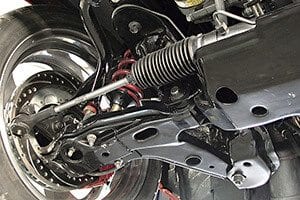It’s important to know about the different parts of your car’s suspension and steering system, as they can affect your vehicle’s ability to handle and control. While the suspension system helps to absorb shock and vibrations from the road, the steering system directs the wheels in the direction you want to go.
In this comprehensive guide, view details we will discuss the different types of suspension and steering parts and their functions, so you can get a better understanding of your vehicle’s overall performance.
Suspension System Parts
The suspension system of your vehicle is what ensures a smooth and comfortable ride while also keeping the tires in contact with the road. Some of the parts involved in this system include:
Shock Absorbers
This help to absorb the shock and vibrations of the road, ensuring a smooth ride.
Springs
The springs help maintain the height of the vehicle and absorb road shocks.
Struts
Struts are similar to shock absorbers but also help to support the weight of the vehicle.
Control Arms
These connect the suspension to the frame of the vehicle and allow the tires to move up and down.
Steering System Parts
The steering system of your vehicle is what allows you to control the direction of the wheels. It involves a number of parts that work together to ensure smooth and responsive steering. Some of the parts you may find in your steering system include the following:
Steering Wheel
This is the part you use to direct your car in the direction you want it to go.
Power Steering Pump
This applies pressure to the steering gear to make it easier to turn the wheel.
Pitman Arm
This connects the steering system to the steering gearbox.
Tie Rods
These connect the steering system to the wheels and help control their direction.
Signs of Wear and Damage
It’s important to regularly inspect your suspension and steering parts for any signs of wear and damage. Some of the signs to watch out for include:
Bumpy and Rough Ride
This could be a sign that your shocks or struts are worn out and need replacement.
Steering Wheel Vibration
If your steering wheel vibrates while driving, it could be a sign of worn-out ball joints or tie rods.
Uneven Tread Wear
This could be a sign of misalignment or worn-out shocks.
Maintenance and Replacement
Regular maintenance is crucial in keeping your suspension and steering parts in good working condition.
- Some tips for maintaining your suspension and steering parts include:
- Regularly inspect your tires for proper inflation and wear.
- Having your vehicle’s alignment checked regularly.
- Replacing worn-out or damaged suspension and steering parts as soon as possible.
Conclusion
Understanding the basics of suspension and steering parts is important in ensuring your vehicle’s overall performance and safety. Regular maintenance and inspection can ensure that these parts stay in good working condition, so you can enjoy a smooth and comfortable ride. Be sure to seek professional help when needed, and don’t hesitate to replace any worn-out or damaged parts to ensure the longevity of your vehicle.
